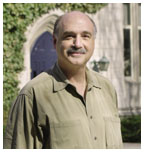
Photo by Frank Wojciechowski |
May 12, 2004: A moment with...
Hendrik Hartog
Marriage wasn’t always about love and happiness. So says Hendrik Hartog, Princeton professor of the history of American law and liberty, who analyzed the laws, court cases, and social context surrounding marriage in his book, Man and Wife in America: A History (2002). Today’s debate over gay marriage is part of an evolution of marriage law that has gone on for more than two centuries, says Hartog, who has been married for 34 years. He spoke with PAW’s Katherine Federici Greenwood.
What laws first governed marriage in the U.S.?
Since marriage has always been a matter of state law, the rules have varied dramatically between jurisdictions. But there is a long history of patriarchy that goes back for generations. Marriage was the way of defining a father’s rights to his children’s labor. Secondly, it was a claim to the labor of one’s wife. Thirdly, for wealthier people it was a way of claiming a kind of lineage and family continuity. The rules before the 19th century had everything to do with making marriage the only legitimate space for sexual behavior – locating reproduction within the family.
Where do love and happiness enter the picture?
The notion of individual happiness that we take as central to marriage was no part of the story. Marriage was about economics. It was about continuity of property. It was about survival. Love was something people grew into through living together. The freedom to enter and exit marriages for individual love and happiness was made possible by easier divorce laws, economic opportunity for women, and the separation of reproduction from sexual activity.
Do you think banning gay marriage is discrimination?
There’s been a lot of change in the institution of marriage, but one of the things that hasn’t changed is that marriage is still immensely privileged in society, with tax laws, spousal benefits, and pensions all favoring married people. So because of those privileges, the denial of a right to marriage to same-sex couples is discrimination.
There is a conservative question that lots of people ask: If you allow gay marriage, don’t you have to allow polygamy as well? And I think the answer is yes. If you say people have a right to happiness and they have a right to form the unions that will make them happy, then you may have to allow more than two people to form unions, as long as you are vigilant to prevent coercion and to insist on the competence of those who would make such decisions.
Why do people who are not directly affected by legalizing gay marriage feel so strongly about the current debate?
I think the religious conservatives who opposed the liberation of divorce and making marriage a matter of individual happiness, and who resisted equalization of relations between husbands and wives, are the same people who now stand against gay marriage. For them, all of these things move toward the destabilization of marriage and move against a certain kind of Christian vision of marriage.
How does religion influence the legal institution of marriage?
Some of the debates over marriage have been about struggles between different religious communities for control of the states. New York didn’t have freely available divorce until the 1960s, in part because of the power of the Catholic Church in the state. Those states that had liberalized divorce laws in the 19th century were often places where there were strong communities of anti-Calvinists, very liberal Protestants. One could say that conservative forces see the gay-marriage debate as a way of capturing a certain aspect of state power in drawing a boundary between gays and straights around marriage.
What do you make of federal government programs aimed at promoting traditional marriage?
It is unusual for the federal government to get involved in promoting marriage. But several generations of social science are based on the belief that marriage is a good thing and should be promoted. Some of that is founded on very solid research, including studies at Princeton by [professor of sociology and public affairs] Sara McLanahan, that show that children of divorce suffer relative to other children. The federal government has lots of information programs, like promoting good nutrition. Most of them are relatively ineffectual.
What’s your definition of an ideal marriage?
Marriage makes sense for some people and doesn’t make sense for
others. People get married because they want a certain kind of stability
in a world full of change, full of uncertainty. People work in situations
without job security, they move everywhere, they uproot themselves. So
we’ve created marriage, which is really an unstable institution
but still it contains the allure of stability, the “till death do
us part.” ![]()

